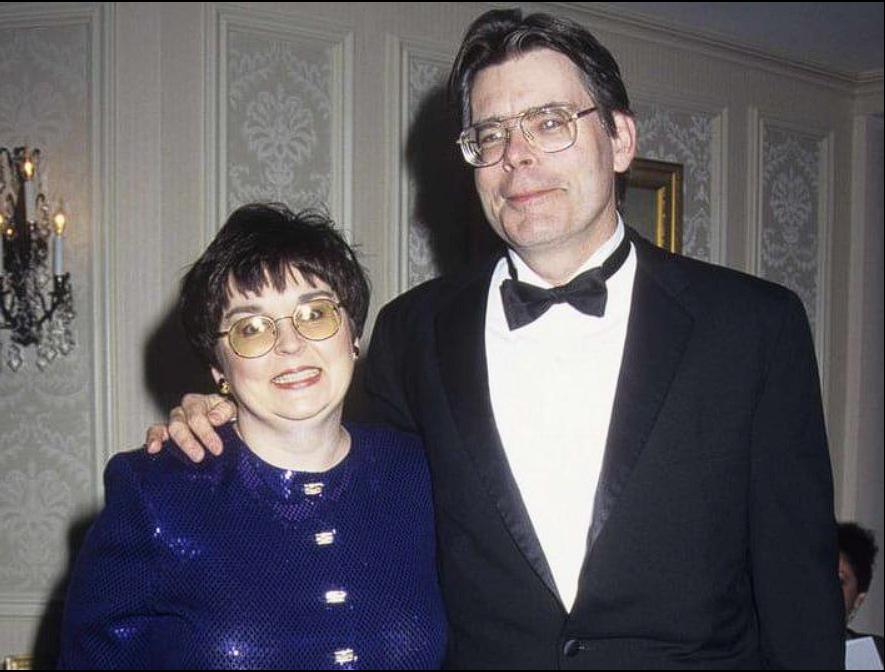“Before Stephen King became the literary titan synonymous with horror, he was a struggling teacher, his days filled with the demands of a high school classroom and his nights consumed by the drudgery of an industrial laundry. The weight of supporting a young family of five, coupled with mounting financial pressures, cast a long shadow, yet amidst this hardship, a nascent dream flickered. He wrote in stolen moments, a corner of a trailer his sanctuary, chasing a vision that often felt impossibly distant. It was in this crucible of struggle that the seeds of ‘Carrie’ were sown, a story nearly lost until the unwavering belief of his wife, Tabitha, intervened, forever altering the landscape of American literature.”
Early Struggles and a Dream on the Brink:
- A Teacher’s Burden, a Writer’s Urge:
- Stephen King’s early years were a stark contrast to the fame and fortune that would later define his life. The demanding schedule of a high school teacher, compounded by the grueling hours at an industrial laundry, painted a picture of relentless effort to provide for his young family.
- This period of intense struggle highlights the dedication and perseverance required to pursue a creative dream amidst the harsh realities of financial hardship and familial responsibility.
- Writing in the Margins of Life:
- King’s commitment to his writing during this period is remarkable. He carved out precious slivers of time, often late at night or in the cramped corner of a trailer, to pursue his passion. This dedication, despite the overwhelming odds, speaks to the deep-seated nature of his creative drive.
- The image of him tapping away in these humble settings underscores the often-unseen labor and unwavering commitment that underlies artistic creation, especially in the early stages of a career.
- Despair and a Manuscript Abandoned:
- The creation of “Carrie,” the story of a troubled teenage girl with telekinetic powers, was not a smooth or immediately rewarding process. Frustration and a growing sense of despair led King to abandon the manuscript, convinced that it lacked merit and wasn’t worth the continued effort.
- This moment of self-doubt and the act of discarding his work highlight the vulnerability and uncertainty that often plague even the most talented artists, especially when faced with repeated setbacks and the pressures of daily life.
Tabitha’s Intervention: The Power of Unwavering Belief:
- A Treasure Found in the Trash:
- The pivotal moment in this narrative is Tabitha King’s discovery of the crumpled “Carrie” manuscript in the trash. This seemingly small act of curiosity and faith would have profound and far-reaching consequences.
- Tabitha’s action underscores the importance of having someone who believes in your potential, even when your own self-doubt threatens to extinguish your dreams.
- Seeing What Stephen Couldn’t:
- Tabitha’s reading of the discarded pages revealed a potential that Stephen himself had failed to see. Her ability to recognize the inherent value and compelling nature of the story speaks to her insightful judgment and her deep understanding of her husband’s creative abilities.
- This highlights the often-subjective nature of artistic evaluation and the crucial role that external perspectives can play in recognizing hidden potential.
- A Quiet, Steady, Unwavering Push:
- Tabitha’s belief in Stephen was not a fleeting enthusiasm but a quiet, steady, and unwavering conviction. This steadfast support provided the crucial encouragement and motivation he needed to revisit and complete his work.
- The power of such consistent and genuine belief cannot be overstated, especially for an artist struggling with self-doubt and the challenges of pursuing a difficult path.
The Spark Ignites: From Rejection to Revelation:
- The Long Road to Publication:
- The journey to publication for “Carrie” was not immediate or easy. The manuscript faced a string of rejections, a common experience for aspiring authors that can further erode confidence and fuel the urge to give up.
- These rejections underscore the often-arduous and discouraging nature of the publishing industry and the resilience required to persevere in the face of setbacks.
- Doubleday Says Yes: A Turning Point:
- The eventual acceptance of “Carrie” by Doubleday marked a significant turning point, validating Tabitha’s belief and reigniting Stephen’s hope. However, the initial success was modest, a quiet beginning to a monumental career.
- This acceptance, though not initially a blockbuster success, provided the crucial validation that often propels an artist forward.
- The Staggering Paperback Sale:
- The sale of the paperback rights for “Carrie” for a staggering $400,000 was the event that truly changed everything. This unexpected windfall provided financial security and the undeniable affirmation of his talent on a grand scale.
- This single sale transformed King’s life and career trajectory, allowing him to pursue his writing full-time and unleashing his extraordinary creative output upon the world.

A Career Ablaze: The Master of Horror Emerges:
- A Prolific Explosion of Creativity:
- Following the success of “Carrie,” Stephen King’s career took off “like wildfire.” The subsequent decades witnessed the emergence of iconic works like “The Shining,” “It,” “Misery,” and “Pet Sematary,” solidifying his place as a major force in American literature.
- This period of intense creativity and widespread success is a direct result of the initial spark ignited by Tabitha’s belief and the subsequent validation of “Carrie.”
- Synonymous with American Horror:
- Stephen King’s name became inextricably linked with the genre of American horror, his unique blend of suspense, supernatural elements, and relatable characters captivating generations of readers.
- His impact on popular culture is undeniable, shaping the landscape of horror literature and influencing countless other forms of storytelling.
- Stories Brought to Life:
- King’s stories have transcended the pages of his books, finding new life on screens both big and small, further cementing his iconic status and introducing his terrifying and compelling narratives to an even wider audience.
- These adaptations serve as a testament to the enduring power and universal appeal of his storytelling.
An Enduring Partnership: A Quiet Tribute to Belief:
- Never Forgetting the Source:
- Despite his immense fame and success, Stephen King has never forgotten the pivotal role Tabitha played in his journey. His consistent and heartfelt acknowledgments of her support underscore the depth of his gratitude and the enduring strength of their partnership.
- This consistent recognition highlights the importance of acknowledging those who support us, especially during times of struggle and self-doubt.
- The Simple Dedication: “For Tabby”:
- The simple yet profound dedication found in many of his books—”For Tabby”—serves as a quiet but powerful tribute to the woman who believed in him when he didn’t believe in himself.
- This understated acknowledgment speaks volumes about the depth of their connection and the enduring impact of her early faith in his talent.
- A Reminder of the Power of Belief:
- Their story serves as a powerful reminder that sometimes, the crucial difference between giving up on a dream and achieving greatness lies in the unwavering belief of another person who sees your worth, even in the moments when you are ready to discard your efforts.
- This narrative offers a message of hope and encouragement to anyone struggling with self-doubt, highlighting the transformative power of external validation and support.
Conclusion:
“The journey of Stephen and Tabitha King is a testament to the profound impact of unwavering belief in the face of adversity. Stephen’s early struggles as a teacher and laundry worker, his near abandonment of ‘Carrie,’ and the subsequent explosion of his career into the realm of literary legend are inextricably linked to Tabitha’s simple act of rescuing a discarded manuscript. Her quiet, steady faith provided the essential spark that ignited a global phenomenon. The enduring dedication in his books, ‘For Tabby,’ stands as a poignant reminder that sometimes, the greatest masterpieces are born not just from individual talent, but from the transformative power of someone who sees your worth even when you cannot see it yourself.”
